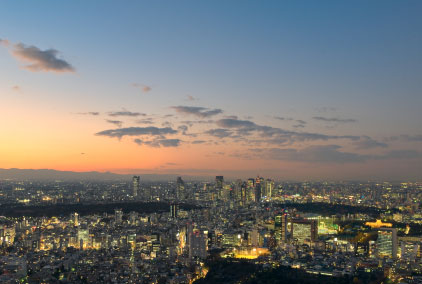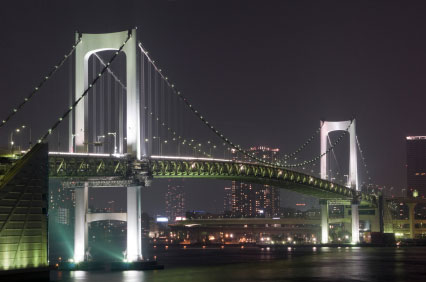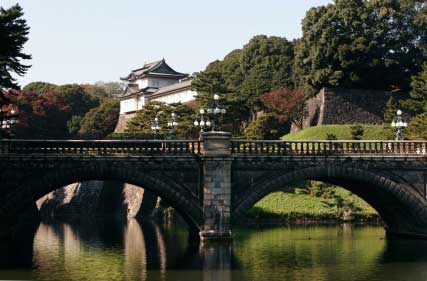The inspiring capital of Japan, Tokyo is a great destination for the modern expat. There are over a million like-minded expats residing in this quirky and character filled metropolis. Offering a fantastic blend of cutting edge technology and mystical, historical sites, Tokyo has much to wonder at, be it in the middle of the city or in the outskirts where you can find some of the ancient temples that litter Japan.

Tokyo can be a hard place to adjust to for the wide-eyed expat. Whilst undeniably exciting, moving to Tokyo can often give one an intense sense of culture shock. Many comforts you take for granted in the west will have to be eschewed once you move to Japan. The Japanese are a very closed society yet are very busy and move at a frantic pace.
Weather wise Tokyo can be quite erratic. Temperatures in the summer can be very hot and winters very cold. Tokyo also has the dubious honour of playing host to some extreme weather conditions, such as torrential rain, strong winds and typhoons. The calmest season is undoubtedly spring in Japan.
Employment Work Permits and Visas
UK citizens can stay in Japan for up to 180 days without needing a visa, but to gain employment in Tokyo you must first gain residential status and a valid visa. Work visas usually last up to three years and are obtained via sponsorship from your employer. Of all the foreigners who are given residency status by the Japanese government roughly 61 percent have done so for the purposes of employment. Some permits given out are job-specific, if you have one of these but wish to change your job then you will have to apply for a different permit. However, permanent residents, spouses or children of Japanese nationals (or permanent residents) may work wherever they choose.
To assist foreigners who are looking for employment in Japan there is the Tokyo Employment Service for Foreigners which, as the name suggests, offers help to foreigners in Japan who are looking for employment. Not only do they help people looking for jobs but they also liaise with businesses that are keen to employ foreigners. Of course you will need a valid passport to enter Japan, but this goes without saying. It will also need at least six months remaining before its expiration date.
Business Culture
Like many other popular expat destinations you may find that when working in Japan you will be exposed to a different business culture than you may be used to. The Japanese are known to place strong emphasis on position and hierarchy and it will be important for them to find you an appropriate position when you begin to work in a Japanese company. Office dealings are always kept very polite and friendly, be they for business or personal matters. More weight is placed on building healthy relationships with colleagues, so be sure to invest a reasonable amount of time in building these relations. This approach to business ensures any problems that may arise can be ironed out in a direct yet non-confrontational way.
Another tradition in the Japanese workplace is the exchange of information when first setting up meetings; offer a portfolio relating to you and your company prior to any meetings you may have. Office attire is smart and the traditional way to greet someone is to give a gentle bow. When exchanging business cards (which will be a frequent activity) offer the card with both hands, and have the Japanese side facing up. You may wish to have your card printed in both Japanese and English.
A key point to remember in Japanese business is the importance of not causing someone to ‘lose face’. To avoid this, never openly and harshly criticise a colleague as this will be most embarrassing. Exchanging gifts is another custom that may be new to you; Japanese business associates are fond of this custom as it indicates a level of respect between colleagues.
Accommodation
Central Tokyo can lay claim to having some of the most expensive properties found anywhere in the world, out in the suburbs accommodation is significantly cheaper and for this reason some employers offer travel compensation.
High-rise flats are the resting place of the majority of Tokyo’s denizens, as opposed to landlords or individual property owners most of the apartments are rented out via estate agents. You may find that some realtors will not deal with foreigners, or gaijins, due to language difficulties. If this occurs, there are special estate agents that cater specifically to Japan’s many expats. Living arrangements in Tokyo are another aspect that may come as a shock to the western expat; apartments can be very cramped and are unlikely to be fully furnished. Almost all documents will be entirely in Japanese so be sure you have a trusted friend or colleague to assist you if making any sort of deal.
Compared to other expat destinations, foreigners are quite widely scattered. However, there is a growing tendency for international workers towards 6 particular areas: Akasaka, Azabu, Hiroo, Aoyama, Omotesando and Shibuya.

Transport
To drive an automobile during your time in Japan you will have to convert your license into a recognised Japanese license. Actually buying a car is not too expensive but maintaining one will incur costs. You will have to undergo routine inspections, pay insurance and also road taxes. There will also be the costs involved with securing two parking spaces, one for home and one for work. Traffic can be congested and hectic, especially during busy times.
The best way to travel around Tokyo is probably via the train services. There is a main train operator and two underground systems operating in Tokyo, Japan Railway, Toei Subway and Tokyo Subway. These train services run throughout Tokyo and are speedily efficient. Tokyo also has buses to cart you around its busy streets. Due to the lack of English signs they may be hard to use and tend to be a secondary means of transport after trains.
Healthcare
Tokyo is a clean and safe city to live in, there are a number of hospitals and many cater to international patients. The Tokyo Metropolitan Health and Medical Information Centre will help you locate the right institution were you to experience any unfortunate medical problems. When staying in Japan you will be required to enrol into a health insurance programme that will cover your medical costs. If you do find yourself in a situation where you are experiencing language difficulties then there is a telephone service run by the AMDA International Medical Information Service Centre specifically to provide language translations with regard to medical aid for foreigners in Japan. Most hospitals will have at least some English speaking staff so it shouldn’t be a huge issue.
There is a ‘Tokyo British Clinic’ which is a clinic for minor ailments and check-ups. This is styled on the NHS’ general practitioner and is much like the local GP you will have seen in the UK
Education
If taking children with you to Japan you may find their education options slightly limited. Expat children will be accepted into Japanese lower schools but unfortunately the curriculum will mainly be in Japanese and have restricted levels of English. There are number of international schools located in Tokyo to cater for the expat child. Of course via these schools you will be able to choose the international curriculum suited to your child. However the international schools in Tokyo can come with some hefty fees attached (up to £20,000 per year), and also long waiting lists.
‘The British School in Tokyo’ is a unique school that actually teaches the UK National Curriculum and is for all ages from nursery to secondary education. The academic results there, like many international schools of high standard, are excellent and exceed those of the UK national average. There are various other options, including The American School in Japan and St. Marys which caters for boys only.
Lifestyle/Entertainment
The Japanese way of living will almost certainly be very different to the lifestyle you are used to. There is a labyrinthine system of etiquette that you would do well to try and learn. Firstly, one should note that politeness is key, Japanese are a very formal and conservative society (on the face at least). The ‘loss of face’ mentioned previously extends outside of the office and you should take care not to cause anybody unintentional embarrassment.
In your spare time you will find that that Tokyo has an abundance of sights and attractions to visit. The Harajuku district is a world famous shopping area where you’ll find cutting edge designer stores selling exclusive jeans, t-shirts and other items that often become highly sought after commodities in the west. It is tempting to try and see as much of Tokyo as is possible in a day, however this could simply prove too much for your senses and it is worth taking your time to properly explore the districts Tokyo has to offer.

If the general buzz and claustrophobic atmosphere of Tokyo is too much, take a short trip on a weekend and explore some of the beautiful Japanese countryside that lies near to the city. This will also serve as a great reminder of what makes Japan such a special place, that remarkable blend of old and new, bright lights and rural peacefulness co-existing in refreshing harmony.
Tokyo has many attractions that you may wish to visit. The majestic Imperial Palace is the home of Japan’s emperor and has been standing since 1888. There are two dates, January 2nd and December 23rd, when the main palace and inner gardens are open; the imperial family may even make a fleeting appearance from their royal balcony. However, the East Gardens are open year round, except on Monday and Fridays. Guided tours are available, but English speakers will have to make do with an audio guide.
The Japanese embassy in the UK can be found here: http://www.uk.emb-japan.go.jp/

